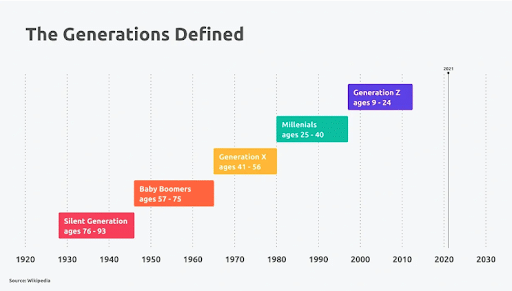A Guide for Elderly Parents in Downsizing Their Possessions
We are very pleased to bring you this information created by Symplicated, a locally owned and operated service company who helps seniors with organizing, decluttering, and relocating to a smaller space without the strain and stress. The information is included below, with their permission, and you can read the original post HERE.
“But Mom, we don’t want your stuff.”
These words can be heartbreaking. After all, you have cherished and saved these items to pass on to your kids. Don’t they see the value in it?
Different generations often have completely different perspectives on the things we keep. We’re going to look at why that is, and what we can do about it.

The Silent Generation
Let’s start with The Silent Generation, born between 1928 and 1945. They were shaped by The Great Depression and World War II. They may have experienced high unemployment, drought, and rationing. They lived frugally because they had to, and each purchase was carefully considered as they searched for items built to last.
For people born in this generation, the view of possessions was “Waste not, want not.” In other words, keep everything because you never know when there may be a shortage, and no one wants to go through that again! Keeping things is just what made sense. So when someone doesn’t want to keep something, they may have a hard time understanding that.
Baby Boomers
After World War II, there was a house shortage due to all the returning servicemen and women, and unusually high birth rates. Born between 1946 and 1964, Baby Boomers were born into a sudden expansion of home building on the outskirts, and Boomers were the first generation to be raised in large numbers in the suburbs.
This was an era of prosperity: families became dual income for the first time, and discretionary income reached a new high. Postwar optimism inspired stability and opportunity, and Boomers became consumers of the first order. They formed a different relationship with possessions than their parents had, but even though they could afford more, they still valued their possessions and wanted them to last.
Generation X
This group of people were born between 1965 and 1980. They grew up in families of working parents who had a lot of disposable income, but not much time or energy for their kids. Parents were able to buy nice homes in the suburbs, but sometimes at the expense of family dinners around a table together. This is also the generation that was coming of age during the technological revolution, seeing the advent of personal computers and email.
Generation X has been bombarded with consumerism and all the so-called advantages of purchasing. They may have over accumulated possessions, and they are realizing that this has started to negatively affect them. This is often why they don’t want or need things that previous generations want to pass down.
Millennials
This generation was born between 1981 and 2000. In a lot of ways, minimalism is a natural way of life for millennials. Technology has always been a part of their world, and they expect to be connected to technology at all times. Their ‘offices’ are in coffee shops or at home.
Mobility is the new stability for this generation, and it’s difficult to be mobile when you own too much stuff. The internet has opened up all kinds of possibilities in purchasing – nearly every product can arrive at our doorsteps in 24 hours with just the click of a button. That means less of a need to accumulate or stockpile things at home. Technology has made it easier to own less. And this is a reason that Millennials, like Gen X, don’t want things passed down from previous generations.
So now that we understand how each generation has been shaped by their collective circumstances and how they might look at possessions differently, what can we do about it?
Ask
Before giving something to the next generation, ask if they want it. When you give something along with the expectation that someone will treasure it like you did, you’re placing heavy expectations on the recipient. It’s so much better to ask if they want it or not. And then respect their answer. If they don’t want it, perhaps you will find someone else who does. Or you can donate it to a local thrift shop so that someone who values it like you did can find it.
Building your legacies without ‘Stuff’
Previous generations saw the gift of hand-me-downs as precious and valuable. More recent generations often don’t. But that doesn’t mean that they don’t value YOU. Think about ways that you can pass on your legacy without physical stuff. Can you spend time together? Can you record your history in written or audio-recorded form? Can you digitize photos with your commentary to preserve history?
When it comes right down to it, you don’t need any physical possessions to live a good life and leave a great legacy for future generations. In fact, our stuff can often hold us back from doing just that.
If your parent or loved one needs more help decluttering or moving to a smaller space, Symplicated will look after every detail of your move, helping you with decluttering, floor planning, packing, supervising the move, unpacking and setting up everything in your new home, serving the Kitchener-Waterloo Region.



